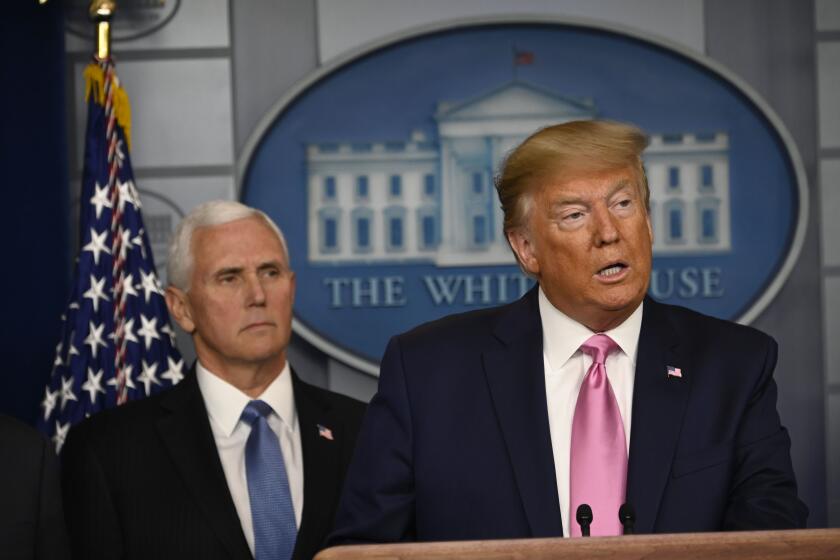Can China be sued in the U.S. and forced to pay for coronavirus losses? Legal experts say no
WASHINGTON — Though President Trump and other conservatives blame China for the enormous damage inflicted here by the coronavirus, legal experts say the recent efforts to sue Beijing in U.S. courts for the trillions of dollars in losses are almost certain to fail.
That’s because of the Foreign Sovereign Immunities Act of 1976, which stands as a strong barrier to suing a foreign state, including a “political subdivision” or “instrumentality” of a foreign government. The law warns judges that a “foreign state shall be immune from the jurisdiction of the courts of the United States and of the states,” with just a few exceptions.
One is for “commercial activity” that is “carried on in the United States by a foreign state” or causes “a direct effect” here. For example, if Argentina sold bonds in this country and defaulted on them, it could be sued for the losses. Similarly, if China made a contract with California to supply medical equipment, it could be sued if it failed to deliver what was promised.
The other major exception is for terrorism. The law says a “foreign state shall not be immune” for claims arising from terrorism, including an “act of torture, extrajudicial killing, aircraft sabotage, hostage taking or the provision of material support or resources” to those who carry out such acts.
But that has not prevented class-action lawyers and state attorneys from filing broad suits seeking huge damages from China over the deaths and economic losses caused by COVID-19, which is believed to have originated in Wuhan, China.
Last month, Missouri’s Atty. Gen. Eric Schmitt filed the first state claim, a lawsuit in federal court in St. Louis seeking to hold the People’s Republic of China and the Chinese Communist Party liable for “an appalling campaign of deceit, concealment, misfeasance and inaction by Chinese authorities that unleashed this pandemic.” Chinese officials “are responsible for the enormous death, suffering and economic losses they inflicted on the world, including Missourians, and they should be held accountable,” he said.
Republican lawmakers, determined to punish China for concealing early data on the coronavirus outbreak, are proposing ways to turn up the heat.
Experts on international law and the foreign sovereignty law said they saw little chance for these claims to win in court.
“These suits are not going anywhere for several reasons, primarily the Foreign Sovereign Immunities Act,” said J. Maria Glover, who teaches at the Georgetown Law School. She said the suits appear to be symbolic and political. “They are looking for someone to blame, and there’s plenty of blame to go around, but these suits have almost zero chance of success in court,” she said.
“I’m not a big fan of the Chinese government,” said Tom Ginsburg, a University of Chicago law professor. He said the United States and other nations have reason to be troubled by the conduct of Chinese officials. “But I think these suits will be dismissed. They are addressed to Chinese government entities, and they are entitled to immunity.”
Lawyers for the Berman Law Group, which filed a class-action claim in a federal court in Miami, say their suit steers around the immunity barrier by citing the Chinese Communist Party.
“They are not the government or a state. They are a separate, independent entity, so they don’t enjoy any immunity,” said Jeremy Alters, who worked on the suit.
Missouri’s lawyers rely on the same claim. “The Communist Party is not a foreign state or an agency or instrumentality of a foreign state, and is not entitled to any form of sovereign immunity,” the suit says.
Experts on the immunities law, also known as FSIA, say that argument will not work.
“In China, the CCP is the state,” said Chimene Keitner, a professor of international law at UC Hastings in San Francisco and a former State Department lawyer. “Courts generally do not view attempts to ‘plead around’ the FSIA favorably.”
She cited rulings by a federal judge in Florida who held that the Communist Party of Cuba was an agency or instrument of the Cuban government, and another by a federal judge in New York who said China Central Television is an instrument of China because it is a mouthpiece for the government.
As if to acknowledge a problem with Missouri’s claim, Sen. Josh Hawley (R-Mo.), the state’s former attorney, introduced a federal bill on April 14 called the Justice for Victims of Coronavirus Act so as to “hold the Chinese Communist Party responsible for causing the COVID-19 global pandemic.”
He explained that his bill, if enacted into law, “would strip China of its sovereign immunity and create a cause of action against the CCP for reckless actions, like silencing whistleblowers and withholding critical information about COVID-19.”
Missouri officials and the class-action lawyers say they have not served their complaints on the Chinese government. That process is complicated and can take months, lawyers say. Chinese authorities would then have 60 days to file a response in the U.S. courts.
In Beijing, Chinese officials and state media have condemned the lawsuits as politically driven and legally unfeasible, and threatened that Chinese companies might in turn sue the U.S. government for incurring losses due to mishandling of the COVID-19 pandemic.
“This kind of lawsuit has no factual or legal basis. It only invites ridicule,” said Ministry of Foreign Affairs spokesman Geng Shuang at a press briefing on April 22. He defended China’s government as “open, transparent and responsible” and said U.S. courts had no jurisdiction over the Chinese government’s actions, based on the principle of sovereign equality under international law.
“Such frivolous litigation will not help the U.S. with its epidemic response, nor will it contribute to the global cooperation in this regard. The right course of action for the U.S. side is to dismiss this abusive lawsuit,” he said.
State news agency Xinhua, in a commentary published on April 30, called the lawsuits “nothing but political pandering by a few U.S. politicians to win elections.”
The Chinese Communist Party’s official newspaper People’s Daily wrote in an editorial on May 3 that U.S. claims of compensation from China for COVID-19 are a “shame for human civilization.”
It also asked why the U.S. had not been forced to compensate the world for deaths and financial losses caused by the 1918 flu pandemic, AIDS epidemic or the 2008 global financial crisis.
In Washington, Secretary of State Michael R. Pompeo has not commented on whether U.S. states, entities or individuals should be allowed to sue China, but he has been emphatic in blaming China for the origin and spread of the disease. He has suggested the virus might have even been produced in a laboratory in Wuhan — a claim dismissed by most scientists — and has accused the ruling Communist Party of lying to conceal the scope of the danger.
In the past, the U.S. government has traditionally resisted allowing their citizens to sue foreign governments for actions overseas out of a fear that other nations would likewise permit their citizens to sue the United States.
Vanderbilt law professor Ingrid Wuerth said the 1976 law aimed to take politics out of these disputes by telling judges they must dismiss lawsuits against foreign states. “The real audience for these suits is probably Congress,” she said. Lawmakers are free to amend the law and open the door to suits against China and others. “That would be terribly unwise,” she added.
Keitner agreed that such suits would fail in the end. “The worst possible thing that Congress could do right now would be to further politicize sovereign immunity by creating jurisdiction for these suits, which are unlikely to result in any actual financial recovery even if they do go forward.”
Savage reported from Washington. Su reported from Beijing. Times staff writer Tracy Wilkinson in Washington contributed to this report.
More to Read
Get the L.A. Times Politics newsletter
Deeply reported insights into legislation, politics and policy from Sacramento, Washington and beyond. In your inbox three times per week.
You may occasionally receive promotional content from the Los Angeles Times.













